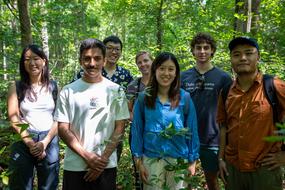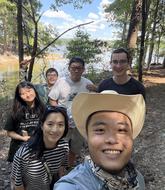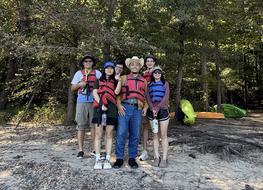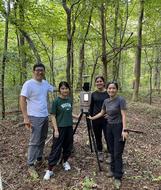I am an ecologist interested in understanding the causes and consequences of biodiversity change at scales ranging from individual organisms to the entire biosphere. I develop data-model synthesis frameworks that integrate remote sensing (e.g., LiDAR, hyperspectral imaging), field sampling, and ecological monitoring networks with Bayesian hierarchical models and Earth System models. I predict how remotely sensed habitats and climate change interact to drive biodiversity shifts, while also quantifying the feedbacks of biodiversity changes on carbon and water exchanges between land and atmosphere. Additionally, I study global forest regeneration potential and its critical role in shaping food web dynamics.
Prior to joining Duke University, I served as a tenure-track assistant professor at the Department of Ecosystem Science and Management at the Pennsylvania State University. I conducted postdoctral research with Dr. Jim Clark and Dr. Jennifer Swenson at the Nicholas School of the Environment. For my doctoral research, I worked with Drs. Conghe Song, Jim Clark, Erika Wise, Diego Riveros-Iregui, and Allen Hurlbert to understand how vegetation phenology is influenced by climate change, extreme weather events, and urbanization.
- Global change ecology
- Spatial Ecology
- Biodiversity
- Phenology and ecoclimatology
- Bayesian hierarchical models
-
Ph.D. in Physical Geography, 2020
University of North Carolina at Chapel Hill
-
B.Eng. in Remote Sensing, 2015
Wuhan University (with the highest honor, GPA ranking 1/229)
Dr. Zhuohong Li is a postdoctoral researcher specializing in deep learning (GeoAI) and Earth observation (AI4EO). His research in computer vision has been recognized with multiple international honors, including a CVPR 2024 Highlights selection and first place in the CVPR OpenEarthMap Challenge. Zhuohong also led the development of SinoLC-1, the first 1-meter resolution national land-cover map of China. This dataset was recognized as an ESI Highly Cited Paper and named the No. 1 Most Valuable Dataset in the 2023 China Top 10 Remote Sensing Events. Dr. Li received his B.Eng. in Communication Engineering and Ph.D. in Remote Sensing from the State Key Laboratory of Information Engineering in Surveying, Mapping and Remote Sensing (LIESMARS) at Wuhan University, where he worked under the mentorship of Professors Hongyan Zhang, Wei He, and Liangpei Zhang. At Duke, Zhuohong is advancing the development of digital twins for urban and forest environments in the United States and is leading the lab’s efforts in applying GeoAI to ecological research.
- Deep learning
- Digital Twins
- Multi-source remote sensing
- Artificial Intelligence
-
Ph.D. in Remote Sensing, 2025
LIESMARS, Wuhan University (the highest honor)
-
B.S. in Communication Engineering, 2020
Wuhan University
Dr. Yu Shen is a postdoctoral researcher with expertise in quantifying ecosystem dynamics across forest and cropland systems using multi-source remote sensing, time series analysis, and deep learning. His work focuses on integrating data from a wide range of satellite and airborne sensors, including Sentinel-2, Landsat, VIIRS, MODIS, GOES, and PlanetScope, to monitor land surface processes at multiple spatial and temporal scales. He earned his Ph.D. and conducted a one-year postdoctoral research under the mentorship of Dr. Xiaoyang Zhang, a leading expert in land surface phenology and fire emissions, and Dr. Hankui Zhang, a member of the Landsat Science Team and a specialist in deep learning for remote sensing applications. At Duke, Yu will advance the understanding of interactions between vegetation and environmental stressors, such as fire and disturbance, particularly in dryland and forest ecosystems facing compounded climate extremes.
- Vegetation Phenology
- Ecosystem dynamics
- Dryland ecology
- Geospatial data fusion
-
Ph.D. in Geospatial Science, 2024
South Dakota State University
-
M.S. in Cartography and GIS, 2019
Chinese Academy of Sciences
-
B.S. in Cartography and GIS, 2016
China University of Mining and Technology
Hanshi is a Ph.D. student in the University Program in Ecology (UPE) at Duke University. Before moving to Duke, she was a Ph.D. student in the Intercollege Graduate Degree Program (IGDP) in Ecology at Penn State. Her research focuses on how climate warming and habitat change interact to shape ecosystem dynamics in both natural forests and human-managed landscapes. She also examines the ecological impacts of restoration practices in Sub-Saharan Africa, with an emphasis on how these interventions influence ecosystem dyanmics and the provision of ecosystem services. She worked with Dr. Weiqiang Chen and Dr. Hua Cai at the Institute of Urban Environment at Chinese Academy of Sciences from 2021 to 2023 before joining the lab.
- Vegetation phenology
- Woodland under global change
- Dryland restoration
- Urban ecosystem
-
M.Eng. in Environmental Planning and Management, 2021
National Taiwan University (with the highest honor)
-
B.S. in Geographic Information Science, 2019
Fujian Normal University (with the highest honor)
Brandt Geist is a Ph.D. student in the Environment program at the Nicholas School of the Environment at Duke University. He previously earned his M.S. in Earth and Environmental Sciences at Vanderbilt University, where he worked with Dr. Lin Meng on research involving urban ecology, remote sensing, and urban planning. A recipient of the National Science Foundation Graduate Research Fellowship Program (NSF GRFP), Brandt’s work at Duke will focus on leveraging multi-sensor remote sensing and ecological big data to examine how anthropogenic activities influence ecological processes in urbanized regions. His research efforts aim to understand the spatial and temporal dynamics of vegetation, biodiversity, and ecosystem functioning to inform sustainable land management and urban design.
- Urban Ecology
- Remote Sensing
- Predictive Modeling
- Global Change Ecology
-
M.S. in Earth and Environmental Sciences, 2025
Vanderbilt University
-
B.S. in Environment and Sustainability, 2023
Cornell University
Rongfei is a Ph.D. student in the University Program in Ecology (UPE) at Duke University. She studies responses of biodiversity to urbanization and global changes across scales and trophic levels. She is interested in applying integrated tools, like advanced remote sensing, ecoinformatics, statistical and ecological modelling to disentangle the underlying complex mechanisms to inform conservation practices. Before joinning Duke, she worked with Dr. Ruishan Chen at Shanghai Jiao Tong University to develope both theoretical and applied models in understanding social and ecological functions in urban habitat gardens using remote sensing, camera traps, and citizen science data.
- Biodiversity modeling
- Plant and animal interaction
- Statistical ecology
- Urban ecosystems
-
M.S. in Landscape Ecology, 2025
Shanghai Jiao Tong University
-
B.S. in Landscape Architecture, 2022
Shanghai Jiao Tong University
Tate Commission is an undergraduate researcher at Duke University (Class of 2029). Tate majors in statistical science and has extensive experience in applying R statistical analysis and visualization on urban greenspace and forestry applications. He has combined layers of satellite imagery to reveal new trends relating socioeconomic factors and suburban sprawl to urban tree canopy cover. He has also visualized data to highlight the various benefits of urban trees across US regions, and proposed additional predictors for the Tree Equity Score in a report for the CEO of American Forests.
- Statistical Science
- R visualization
- ggplot
- urban greenspace and forestry
-
B.S. in Statistical Science, 2025 -
Duke University
Ivy Geng is a climate scholar and undergraduate researcher at Duke University (Class of 2028). Ivy double majors in Earth and Climate Science and Public Policy. She is leading a team to characterize the fragmentation of urban greenspace and its effects on ecosystem services in cities, with ultimate goal to inform policy making. She worked at Tsinghua University as a high school student, where she contributed to projects on microplastic runoff and soil remediation following heavy metal contamination. During that time, she independently designed and conducted environmental experiments, resulting in multiple first-author publications in peer-reviewed journals.
- Urban ecosystems
- Climate adaptation
- Urban greenspace
-
B.S. in Earth Climate Science and Public Policy, 2024 -
Duke University
Alumni
- Xiaolu Li — postdoc at Penn State and then transferred to Duke; now at Shandong Normal University (May 2023 – April 2025)
- Yu Wei — Ph.D. student at Penn State and then transferred to Duke (Fall 2023 – Spring 2025)
- Kelly Wu — Master of Engineering at Duke; now Ph.D. student at University at Buffalo (Sep 2025 – May 2026)
- Rosanne Yang — Master of Environment Management (MEM) at Duke (MP advisor) (July 2024 – April 2026)
- Luke Dauner — MEM and MF at Duke (July 2024 – Dec 2025)
- Maanvi Chawla — Duke ECE major (Fall 2025)
- Shaoyu Feng — Duke Kunshan University ENV major (Fall 2025)
- Georgiy Zemlevskiy — Duke Math and Physics major (Summer and Fall 2025, Data+ program)
- Sophie Mao — Duke CS major (Summer and Fall 2025, Data+ program)
- Hashim Alrefaei — KAU CS major (Summer 2025, Data+ program)
- Alexis Fox — Duke CS major (Fall 2024 and Spring 2025)
- Max Xiong — Duke CS major (Fall 2024 and Spring 2025)
- AJ Gable — Penn State forestry major (Summer 2024)
- Kingston Gearhart — Penn State forestry major (Summer 2024)
- Evan Hackett — Penn State forestry major (Summer 2023)
- Fin Turnage-Barney — Penn State geography major (Summer and Fall 2023)







